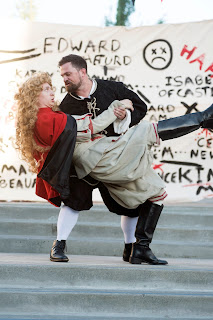 |
| Gene Chin (Tempura), Danielle Weathers (Corinna), Michael Morrow Hammick (Mitch), Olivia Shimkus (Daisy and others), Pam Mahon (Lureena), Gary Wayne Cash (Rick Shaw), and Joey Côté (Joe and others). |
By Tina Arth
After a summer of big, beautiful, classic musical theatre,
Broadway Rose kicks off its return to the smaller New Stage by offering a
quirky, utterly silly show with absolutely no redeeming social value – and I
love it! The sets, costumes, lighting, choreography, and music set the stage
for an unashamedly campy homage to film noir. Director Isaac Lamb and his cast
embrace the genre’s stereotypes with typical Broadway Rose panache and an
enthusiastic embrace of the absurd reminiscent of Young Frankenstein, Airplane,
or the occasional episode of American
Dad!
Christopher Durang (book and lyrics) and Peter Melnick
(music) set their little parody in Macao, China circa 1952. The plot is utterly
predictable and fundamentally irrelevant – a small group of troubled Caucasians
(casino owner Rick Shaw, rival cabaret singers Lureena and Corinna, and the
handsome but hard-boiled Mitch) are trying to escape their troubled pasts in a
den of iniquity; Mitch seeks to clear himself of an unjust murder charge by locating
the mysterious McGuffin. As apparently the lone Asian in the world’s most
densely populated city, the pianist Tempura portrays every possible Oriental stereotype
with a veneer of subservience thinly covering his simmering hostility. All’s well that ends well, with everyone back
in NYC and the principles paired appropriately.
The first real joke in the show lets the audience in on the
fun – after a brief (and, of course, hard-boiled) dockside flirtation, Mitch
says “See you around, I hope” and Lureena replies “Well, it’s a small cast.”
From there on, we know that they know that we are watching. Even though the
fourth wall is only broken a few times, it’s enough to ensure that the stylized
and melodramatic performances are perceived from the beginning as intentional
parody.
Pam Mahon is absolute dynamite as “Lureena.” Her voice and
stage presence are huge – even though the big ballads and bigger production
numbers are (as generally expected in parody) quite forgettable, her
performance is anything but. As the opium sniffing “Corinna,” Danielle Weathers
shifts from drug-addled has-been to fighting tigress with aplomb, and she is
perhaps the best physical comedian in the cast.
Casino-owner “Rick” (Gary Wayne Cash) seems to have been overlooked when
the authors were handing out the fun roles, but the pseudo-poignant “Rick’s
Song” makes it clear that he had been intentionally, rather than inadvertently,
overlooked. Michael Morrow Hammack (“Mitch”) is the quintessential antihero –
brooding, almost too handsome, with a perfectly trimmed two-day growth of beard
to accentuate his chiseled chin. He seems to channel Humphrey Bogart, but with
a much, much better singing voice.
Gene Chin (named “Tempura” because he’s been battered by
life) gets many of the best lines, and he makes the most of them. Suggest that
he is inscrutable, and he stomps his feet and insists that he is utterly
scrutable. Chin’s operatic background makes “Tempura’s Song” even funnier –
that powerful and lovely voice singing the praises of a “rovely rotus reef” –
and his magic disappearing act after the final dockside battle is stunningly
devoid of magic. The remaining two characters (Joey Côté and Olivia Shimkus) play a multitude of
roles (it is, after all, “a small cast”) – and while Shimkus doesn’t get much
chance to really shine, Côté
is haplessly wonderful leading the audience in a round of “Row, Row, Row Your
Boat.” In fishnet tights he also proves that he, not Chin’s “Tempura,” has the
best legs in the cast.
As
always, music director Mont Chris Hubbard and his tiny band are flawless, and
their placement at the back of the stage ensures that they do not overpower the
vocalists. The sets are appropriately cartoonish, and the first scene change
(from the docks to the club interior) is breathtakingly efficient. The costumes
(especially the women’s) are tastefully over the top, and the Carmen
Miranda-like headdresses in the final performances are simply wonderful.
Adrift In Macao is perfect for audiences
looking for a little R-rated entertainment – the plot may be predictable, but
the strong vocals combined with laughs that often come in unexpected places
makes it an evening well-spent.
Adrift
in Macao runs at Broadway Rose’s New Stage, 12850 SW Grant
Avenue, Tigard through October 25th.







